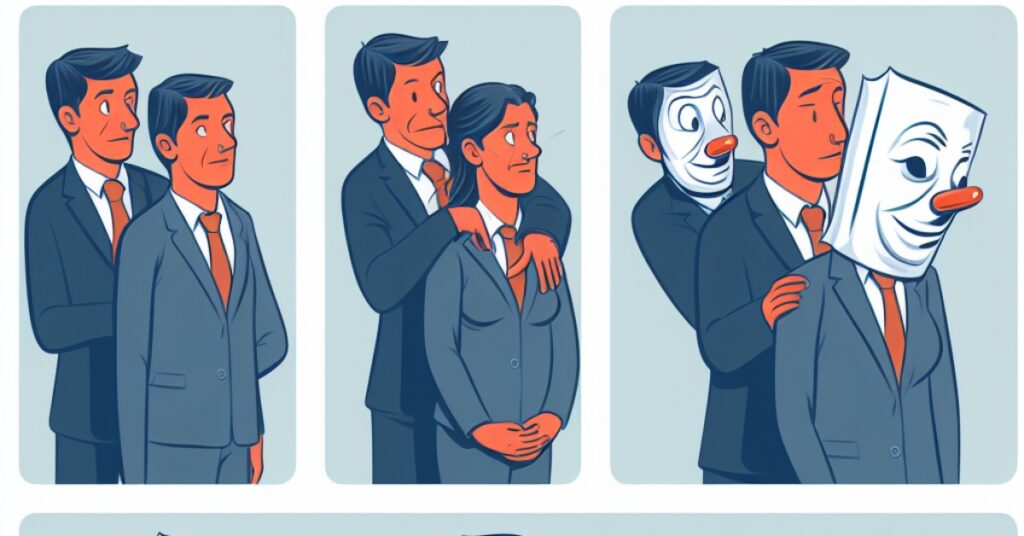In a world where opinions and expertise abound, it is important to recognize the 7 signs of stupidity. Identifying these indicators promotes both individual and group growth, in addition to helping to avoid mistakes.
Many times, we come across people whose behavior is so unpredictable that the question arises whether they are rational beings. They find it difficult to understand things that seem very simple, and they quickly make questionable decisions that would make anyone suspicious.

Since they often fail to identify their own actions, this is not their fault but a result of their poor intelligence. This lack of intelligence can result in problems in communication and relationships.
The purpose of this post is to help people recognize seven possible indicators of ignorance in their lives. We want to support them in being aware of these behaviors and finding solutions to stop them, not belittle them or make them feel better than they are.
So, let’s examine seven signs of stupidity that indicate someone is getting stuck in the quagmire of intellectual ignorance.
7 Signs of Stupidity
No matter how hard someone tries, if he is a fool, he will never be able to hide his stupidity. However, here are seven signs of stupidity that you should be aware of.
Sign1: The Trap of Overconfidence
The overconfidence trap is one of the main signs of ignorance. Individuals who think they know everything often overlook insightful criticism and their ignorance. It is imperative to recognize that genuine wisdom stems from a modest acknowledgment of the immensity of the unknown.
Sign2: Absence of Curiosity
The spark that ignites intellectual growth is curiosity. Stupidity frequently appears as narrow-mindedness and a reluctance to consider novel concepts. Developing a curious mentality promotes innovation and discovery and provides avenues for lifelong learning.
Sign3: Inadequate Decision-Making
Making persistently bad decisions is directly associated with stupidity. People who consistently make the same mistakes and disregard evidence are not capable of critical thought. The first step to escaping the stupidity loop is realizing the patterns of poor choices.
Sign4: Unable to Adjust

Those who fight change frequently become victims of ignorance because change is unavoidable. Both a fear of the unknown and an incapacity to adapt can be obstacles to one’s professional and personal growth. Being adaptable and receptive to change is essential for overcoming life’s obstacles.
Sign5: Absence of Compassion
Being able to comprehend and feel other people’s viewpoints is a sign of emotional intelligence. Conversely, stupidity is characterized by a lack of consideration for the opinions and feelings of others. Empathy-building improves interpersonal interactions and makes society as a whole more harmonious.
Sign6: Inflexible Thought

Having a dichotomous mindset frequently leads to foolishness. An unwillingness to consider different ideas and an incapacity to consider various points of view impede intellectual development. Enhancing our cognitive abilities expands our perspective on the world.
Sign7: Dependency on Others
Seeking advice is important, but uncritical faith in those in positions of power without exercising independent judgment is cause for concern. Stupidity frequently appears when people give up on their capacity for independent thought. Intellectual maturity requires the ability to strike a balance between deference to authority and independent thought.
Inconsistent Logic
Logic-deficient thinking and contradicting views are characteristics of idiocy. Reflection and a dedication to logical reasoning are necessary to develop a cogent and reasonable mental process. An indication of intellectual integrity is consistency in one’s arguments and ideas.
The Dangers of Ignorance

Ignorance has practical repercussions in addition to its theoretical elements. It can harm one’s personal and professional life, resulting in strained relationships and lost chances. Being aware of the risks associated with ignorance inspires people to work toward ongoing improvement.
Read More: Why do people stay in toxic relationships?
11 Tips to Deal with Stupid People

It might be difficult to deal with people who show evidence of foolishness or ignorance, but it’s important to handle these circumstances with grace and understanding. These are 11 fantastic pointers on how to deal with people who don’t always exhibit the highest level of intelligence.
1. Continue to be patient and calm
The first piece of advice to follow while dealing with someone who is being ignorant is to remain composed and patient.
Anger- or frustration-based reactions simply make things worse.
Inhale deeply, gather your thoughts and approach the conversation with composure.
2. Pick Your Battles Carefully
Not every situation calls for conflict. Consider how serious the situation is, and pick your battles carefully. Occasionally, it’s preferable to overlook a small amount of ignorance than to get into needless arguments.
3. Show Empathy

It is essential to recognize that everyone has varying degrees of expertise and viewpoints. Try to understand the situation from the perspective of the other person to demonstrate empathy. Empathy can promote improved dialogue and ease conflict.
4. Use Laughter to Reduce Stress
Using humor to navigate talks with people who lack knowledge can be quite effective. Use lighthearted humor to diffuse the situation and change the tone of the conversation to something more upbeat, rather than reacting with fury.
5. Set a good example
Act out the behavior that you want to see. When you come across foolishness, react with tolerance and wisdom. Setting a good example might encourage people to reevaluate their beliefs and behaviors.
6. Give constructive criticism
Give respectfully offered constructive criticism when circumstances permit. Point out errors or misunderstandings tactfully, stressing the need for understanding rather than assigning blame.
7. Look for Common Ground

To establish a link, look for areas of agreement. Even in situations where there are gaps in knowledge or comprehension, finding common interests or ideals can pave the way for more constructive encounters.
8. Promote Critical Thought
Promote critical thinking without passing judgment. Ask thought-provoking questions that encourage the person to examine different viewpoints. This strategy may promote a more receptive mentality.
9. Recognize When to Leave
Know when a conversation is going nowhere or toward conflict. It’s acceptable to turn away and leave a situation where a productive conversation may not be possible.
10. Teach Without Prejudice
When appropriate, impart pertinent knowledge without coming across as patronizing. Since people are more open to learning when treated with respect, try to provide helpful, nonjudgmental instruction.
11. Take Care of Yourself
Ignorance can be emotionally taxing to deal with. Establish limits and take breaks as needed to practice self-care. Maintaining your well-being requires surrounding yourself with positive influences.
Recall that the objective is to manage conversations with respect and understanding, not to raise the cognitive level of the other person. You can use these suggestions to transform difficult situations into chances for development and better communication.
Conclusion
In short, knowledge and awareness of the 7 signs of stupidity are essential for both personal and social well-being. Intellectual maturity is achieved through constant self-examination, dedication to education, and acceptance of different viewpoints. If people remain alert and deliberately stay away from the trap of foolishness, they can handle the intricacies of life with grace and intelligence.
FAQs
How can you tell if someone is unintelligent?
Communication clarity and reasoning gaps may suggest lower intelligence in someone.
What classifies someone as dumb?
A lack of critical thinking and poor judgment may classify someone as dumb.
How do you deal with an unintelligent person?
When interacting with those who lack intelligence, patience, empathy, and clear communication are beneficial.
Can someone have a low IQ but be smart?
Yes, emotional intelligence and creativity can coexist with a lower IQ.
How do I know if I’m actually smart?
Adaptive learning, problem-solving skills, and self-awareness signal intelligence.

